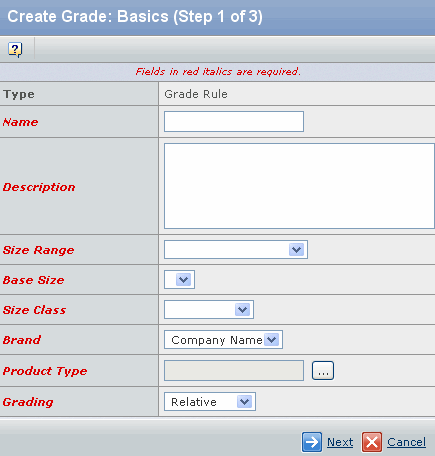Creating a Grade Rule | ||||
|
| |||
From the global toolbar, click
 > Standards
> Grade Rules to open the Grade Rules page.
> Standards
> Grade Rules to open the Grade Rules page.
From the Actions menu, click Create Grade Rule or click
 > Standards > Create Grade Rule.
> Standards > Create Grade Rule.

Specify the following.
Field Name How to Enter Type Default to Grade Rule. Name Name for the grade rule you are creating. Description Description of the grade rule you are creating. Size Range Select the Size Range for which you want to create the grade rule from the drop-down list. You must first specify the Size Range before selecting the base size. The size scales are created by the Administrator and cannot be edited. To view the available size scales, click Style Design > Standards > Size Scales. Base Size Select a base size from the drop-down list. This size you specify is used as the base or constant for calculating the other sizes within the size range. Size Class Size class such as Big and Tall, Missy Petit, Missy, or Regular from the drop-down list. Brand Click  to search for and select
a company you want to set as the brand.
to search for and select
a company you want to set as the brand.Product Type Click  to open the Select Type
page. Select a product from the different available product types for
which you are creating the grade rule.
to open the Select Type
page. Select a product from the different available product types for
which you are creating the grade rule.Grading Select a grading from the drop-down list. In Relative grading, grades are respective to base size; in Incremental grading, the grades are respective to the preceding size. When finished, click Next.

The list of points of measure display. Points of measure is the specific part of the product for which you are creating the grade rule. For example, you can set points of measure for a shirt as the Chest Size, Length of the shirt, Length of the arms, and so on. You must select an option you want to specify as the points of measure for the grade rule.
Click Next.

Specify the following.
Field Name How to Edit Name Name column displays the point of measure you selected. Description Descriptive name of the point of measure. Requirement? Specifies whether or not the point of measure is required on a measurement chart when the grade rule is applied. Specify the requirement as Default, Mandatory, or Optional from the drop-down list. The point of measure will automatically be added to the measurement chart when applied in case of Default and Mandatory values. It can be removed by the technical designer if the requirement is Default but in case of Mandatory value, the point of measure cannot be removed from the measurement chart. If the requirement is Optional, the point of measure will not be added to the measurement chart when the grade rule is applied. These points of measure will be available to add after the measurement chart has been created. Tolerance (-) Specify a value to set the lower tolerance level for the sizes. The tolerance level is set to set the permissible degree of variation in the sizes created by the grade rule. Tolerance (+) Specify a value in this column to set the upper tolerance level for the sizes. The tolerance level is set to set the permissible degree of variation in the sizes created by the grade rule. (Apply All) 
Entering a value into this column automatically applies the entered graded increment across the entire row. Note: The other columns display the various sizes according to the size range you selected. If Relative grading is set in the Preference page, grades are displayed respective to base size. If Incremental grading is set in the Preference page, the grades are displayed respective to the preceding size.
Specify the deviation for each size in the editable column. The base size is not an editable field. The following example describes the setting of grade rule based on the base size:
The parameters in the Create Grade: Edit Grades and Tolerances page for a Chest point of measure is as follows:
- XS: 1.0
- S: 1.0
- M: 0.0 (base size is not editable)
- L: 1.0
where XS, S, M, and L are sizes within the size range.
The Chest measurement for the XS (Extra Small) size garment is 2 sizes smaller, which is the sum of all differences from base than the Chest measurement for a Medium size (base size) garment. Likewise, the Small (S) size garment is 1 size smaller and the Large (L) is 1 size larger.
When you apply the grade rule to an actual product, you input the value for the base size and the other sizes are automatically calculated using this value.
If Validation is set to true in the properties file, you must specify values that are multiples of least count, such as 1/8 and 1/16, specified in the properties file. An error message displays if an incompatible value is specified.
If Rounding Off is set to true in the properties file, the value you specify is rounded off to the nearest value to the least count specified in the properties file.
Click Done.